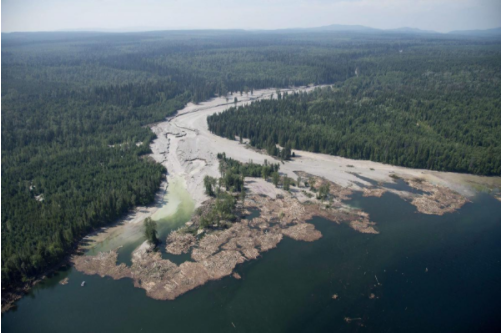Three years after Canada’s largest mine waste disaster, communities in the Cariboo-Central Interior of British Columbia learned that the Province will not lay any charges under the BC Environmental Management Act. Instead, residents will have to wait for the Federal government to decide whether to lay charges under the Fisheries Act. In the meantime, the Mount Polley disaster continues to put peoples’ rights at risk.
“There has been serious trauma experienced by the communities who today are afraid to eat the salmon and other fish from the lakes, rivers and creeks contaminated by the mine disaster. Our lives and livelihoods have been put at risk and the company continues to pump waste into these already fragile watersheds,” says Kanahus Manuel, from the Secwepemc Women Warriors.
On August 4, people and communities from Tofino to the Arctic to Labrador will participate in solidarity actions to remember the Mount Polley mine disaster and the watersheds at risk using the hashtag #SisterStreams.
Xaxli’p First Nation Councillor, Colleen Jacob, says, “The Mount Polley disaster has made our whole way of life even more uncertain than it already was. The increasing pressures on the salmon, along with the effects of Mount Polley, has put our fishing in further jeopardy. It is very hard to see this happen. There needs to be meaningful consideration as to how it has affected our people and what can be done about it.”
The breach sent 24 million cubic metres of mine waste and water into nearby lakes and rivers in the Cariboo region of Central BC. The disaster exposed the weakness of BC’s mining regulations which left BC residents on the hook for millions of dollars in ongoing issues related to the disaster. In April 2017, despite opposition from locals, the BC government issued a permit to Imperial Metals to discharge mine waste directly into Quesnel Lake.
“The residents of Quesnel Lake and surrounding area have lost all trust in both Mount Polley Mine and the Government,” says Christine MacLean from Concerned Citizens of Quesnel Lake. “Fines and penalties must be levied. A criminal investigation into the reason why the failure happened must be completed.”
“The BC government reports that the Mount Polley tailings dam failed due to faulty design and construction and inadequate water and dam management,” says Tara Scurr, Business and Human Rights campaigner for Amnesty International. “BC’s mining laws do not require companies to meet their human rights responsibilities under International laws that Canada is party to. The province must immediately stop activities which are causing further harm, reform BC’s mining laws, and provide justice for people whose rights were violated.”
“Governments have failed to lay charges and enforce the law, despite clear and ample evidence to justify proceeding,” says Ugo Lapointe, Canadian Coordinator for MiningWatch Canada. “We fear that this sends the wrong signal to the industry across the country and undermines public confidence in the capacity of our regulatory system to work effectively to protect our environment.”
Close to 35,000 people have signed a Sum of Us petition demanding that the Liberal government take action on Mount Polley. The petition will be delivered to the Energy and Mine Minister’s Conference in New Brunswick this August
“The federal government has the opportunity to live up to its commitments and create a new relationship with Indigenous communities. The Mount Polley disaster has put a tremendous social strain on all of the communities impacted,” says Jacinda Mack of First Nations Women Advocating Responsible Mining. “Coupled with the fear and uncertainty that the wildfires raging in our communities have provoked, the future is uncertain for our territory and watersheds.”
Further quotes:
Tla-o-qui-aht First Nations elder Levi Martin: “Water is one of the four sacred elements—without good clean healthy water, nothing survives in this world” said Tla-o-qui-aht First Nations elder Levi Martin. “We do not want Imperial Metals in Tla-o-qui-aht territory, because all the land, the water and the resources belong to our children, and great-great-grandchildren”.
Romeo Saganash, MP- “The [UN] Declaration [on the Rights of Indigenous Peoples] recognizes that Indigenous Peoples are experts on their own rights. It honours the tenacity and knowledge of our ancestors by reaffirming our inherent rights,” notes Member of Parliament Romeo Saganash. “But the Declaration is not only for Indigenous Peoples. It is for all of us. The Declaration provides guidance to governments, a roadmap for non-Indigenous peoples to better understand their responsibilities and a powerful tool to advocate for Indigenous rights, both collective and individual.”
Jackie McVicar, United for Mining Justice: “Across the country – and world – communities are demanding justice and accountability from the mining industry and the governments that support them. We respect the inherent right that Indigenous communities have to say no to resource extraction projects that put their lives and livelihoods at risk.”
Contact: Sue Montgomery, media relations Amnesty International Canada smontgomery@amnesty.ca or 613-744-7667 ext 236













